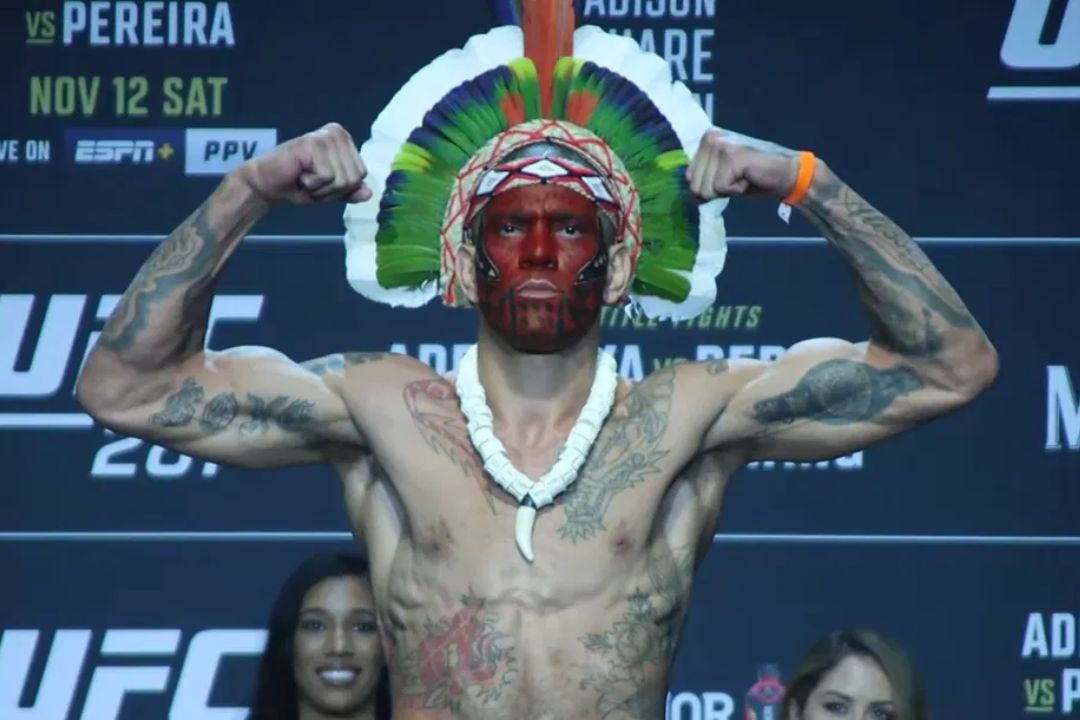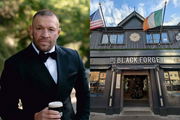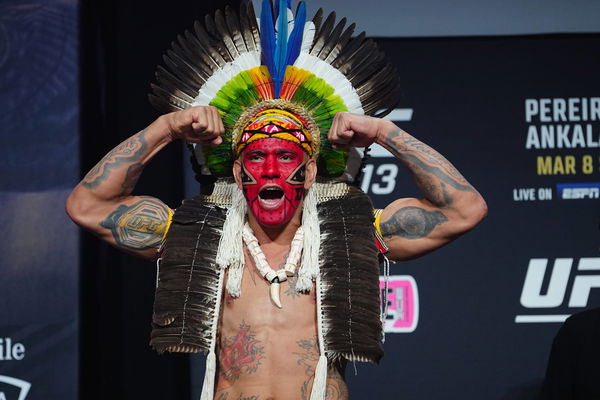

Alex Pereira isn’t just a two-division UFC champion. He’s also one of the most recognizable indigenous athletes in the world. Almost four years since his 2021 UFC debut, Pereira has been able to capture two titles in the organization. Yet, behind the painted face and bow-and-arrow walkouts lies a story few truly know.
Watch What’s Trending Now!
The Brazilian star, set to fight Magomed Ankalaev again at UFC 320 on October 4, often speaks proudly about his roots. But was Pereira born into the tribe he represents? Or did his connection to the Pataxó people come later in life? Let’s break it down.
ADVERTISEMENT
Where is Alex Pereira from? Ethnicity & nationality
Alex Pereira is a Brazilian national, born and brought up in the Latin American country. His ethnic roots led the light heavyweight champion to the Pataxó tribe. The native tribe has a population of a little less than 12,000 in the Bahia region of Brazil.
They used to speak the now-extinct Pataxó language. Later on, a revitalized version, Patxohã, and Portuguese replaced the now-extinct language while retaining some of the Pataxó words.
Top Stories
Alexander Volkanovski Clears Stance on Retirement as He Gives Final Verdict on Lightweight Title Run

24-YO Man Pleads Guilty to Arson of Conor McGregor’s Pub ‘The Black Forge Inn’

“He Was Just a Kid!”: MMA Community Mourns 15-Year-Old Prodigy Stabbed to Death in Tajikistan

Khamzat Chimaev Riles Up Brazilian MMA Community With Another Alex Pereira UFC White House Callout

Paramount+ Price Set to Increase Just Days Before UFC 324: Gaethje vs. Pimblett

Growing up, life was, by no means, easy for our resident 205-pound superstar. Alex Pereira had to drop out of school due to financial reasons, leading him to work as an assistant to a bricklayer and then work at a tire shop. This was a rough phase in his life that would eventually lead to alcoholism. He has been vocal about those tough times later when he became a UFC superstar.
ADVERTISEMENT
However, things would turn around for the Brazilian ace, who’d get into martial arts and start kickboxing at the age of 21, and he always represented his roots every time he competed. Now, what’s the story behind his tribe?
ADVERTISEMENT
Details about Alex Pereira’s Pataxo tribe
The indigenous tribe of Pataxo consists of about 11,800 people, according to certain reports. They went through turmoil in the middle of the last century. Not only was the indigenous population’s region mainly converted into private farms, but they were also expelled from the forest. As a result, the larger society integrated them into its fold, and further, they lost their indigenous identity.
Furthermore, the fighter’s famous bow-and-arrow walkout ritual has a native connection. Talking to ESPN, the kickboxer-turned-MMA fighter once said, “I made a ritual with the bow and arrow. Then a sequence with the indigenous music and that’s how it started.” Thus, this signature entrance became his method of paying homage to his culture and family, and it made him more confident.
In the same segment, the former Glory champion revealed that his first kickboxing teacher had indigenous roots and further admitted that his grandparents were indigenous. Notably, the Sao Paulo fighter wants to help the ‘forgotten’ native population. Thus, he stated, “I want to make a name for myself and in the future use it to help the indigenous people… With that [UFC platform’s media advantage], I have the potential to really help the indigenous people.” Interestingly, Alex Pereira’s nickname also reflects his ethnicity.
ADVERTISEMENT
Significantly, Pataxó also inspired the 38-year-old Alex Pereira’s nickname, ‘Poatan’. ‘Po’ in his native language translates to hands and ‘Atan’ is a stone equivalent—hence, giving Pereira an apt nickname. However, the Sao Paulo fighter paid tribute to the same with a tattoo of pebbles and rocks on his left hand.
Remarkably, during the pandemic, as the native population had trouble feeding themselves, Pereira left Sao Paulo and went to Porto Seguro to donate food for them. He’s done such acts for many communities, remembering the tough times he had to undergo through his younger years.
View this post on Instagram
ADVERTISEMENT
Meanwhile, things have changed for Alex Pereira’s tribe and their situation seems to be getting worse as their history has been ridden with sadness. The UFC champ’s ethnic community and every other indigenous community in Brazil had been riddled with tragic events for hundreds of years, with the Pataxo tribe being one of those tribes being subject to brutal treatment—slavery, disease, and genocide. Moreover, things got increasingly difficult for Alex Pereira’s tribe after they experienced violence and had their land snatched by outsiders.
“That’s when they finally backed off because they came to k** us all,” a woman from the Pataxo tribe told Mongabay. The legal system also doesn’t seem to back them as a state judge of Bahia, the region in Brazil where they are based, rallied to evict them from their land. “We experience a lot of violence from the agribusiness on our land,” a Pataxo leader added.
With the people facing certain hurdles, Alex Pereira keeps doing his bit by giving back to the community. But here’s the catch: he didn’t actually grow up among them.
ADVERTISEMENT
Did Alex Pereira really grow up in a tribe?
The truth? No. Pereira grew up in the favelas of São Paulo, far from the Pataxó villages. His early life was filled with hardship, not traditional rituals. He dropped out of middle school, worked as a bricklayer’s assistant, then at a tire shop for 14 years. Surrounded by heavy drinkers, he too became hooked on alcohol.

Imago
UFC 313: Pereira vs Ankalaev Ceremonials Weigh-ins LAS VEGAS, NV – MARCH 7:Alex Pereira speaks with Joe Rogan at UFC313 – Pereira vs Ankalaev at UFC APEX on March 7, 2025 in Las Vegas, Nevada Photo by Louis Grasse/PxImages Las Vegas, Nevada UFC APEX LAS VEGAS, NV United States Copyright: xLouisxGrassex
But Pereira made a choice that changed everything. He walked into a kickboxing gym. That decision not only rescued him from alcoholism but put him on the path to combat sports glory.
ADVERTISEMENT
His first gym had many indigenous fighters, and that’s where his nickname “Poatan” (Hands of Stone) emerged. Ironically, it comes from the Tupi language, not the Pataxó. His true introduction to his tribe came much later — in 2014.
ADVERTISEMENT
More about Alex Pereira’s early life struggles & background
That year, Pereira’s coach, Belocqua Vera, took him to Bahia to meet the Pataxó people. It was a transformative moment. Pereira vowed to represent them from then on.
Since that day, he’s kept his word. At weigh-ins, he paints his face and dons their traditional headdress. Ahead of UFC 313, he even exchanged gifts with the tribe’s leader, Ubiranan, who gave him a special eagle-feathered headdress. In Pereira’s words: “He told me he would do a special headdress with eagle feathers that means vision.”
So while Pereira didn’t grow up in a tribe, his connection today is real and deliberate. He may not have been raised in their villages, but he now carries their legacy into the global spotlight. As he prepares for his rematch with Magomed Ankalaev at UFC 320, one thing is clear: Pereira’s heritage is no longer a background detail. It’s part of his fight, his image, and his mission.
ADVERTISEMENT
ADVERTISEMENT
ADVERTISEMENT

